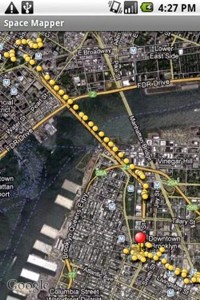Space Mapper is an ‘app’ analyzes the social inequality
linked to the mobility in large cities.

The places that he frequents an urbanite, the streets that runs through and the type of transportation that you use can vary in function of the social stratum to which it belongs. A mobile application developed by researchers of the Upper Council of Scientific Investigations (CSIC) and the University of Princeton, in the united States, records the movements of voluntary users that the downloaded. Space Mapper aims to detect patterns of mobility associated with the different social strata living in the big cities.
Through this information, the research aims to relate the mobility in large cities with information of a social character and demographic. The CSIC researcher at the Center for Advanced Studies of Blanes Frederic Bartumeus explains: “With these data we try to bring to the fore the potential inequalities associated with the use of public space in cities and to promote their design in terms of their use”. The application may relate, for example, certain areas of the cities with higher levels of pollution and crime, associated to certain social strata in particular.
For its part, the investigator of Princeton University’s John Palmer explains: “most of us move through only small areas of the cities in which we live. These areas are important because they determine our access to resources such as health care and food.”
Space Mapper has a series of options that allow the user to decide what type of information you want to provide and how often you want to register your movements. The collected data are encrypted and sent to a server in the american university where it is stored completely anonymously. Currently, Space Mapper is only available for the Android operating system, although Bartumeus says, “soon to be released the corresponding versions for other mobile platforms”.
The project is currently focused on detecting patterns of Barcelona, New York and Los Angeles (both in USA), while the CSIC researcher explains that “the information of any other city will also be welcome and analyzed”. For Bartumeus, “the larger and more diverse sample of users, the more significant will be the conclusions.”
Data mobility can be matched with information on each city related to types of spaces, crime rates and air pollution, among others. Palmer believes that “the more you know about the cores of urban activity the better you will understand the forces that lead to social inequalities”.
In the same way, Bartumeus of the opinion that you will be able to identify problems associated with their own mobility. “It is possible that you observe a mass of significant individuals move routinely from one area of the city to another and that there is a good transportation option that connects them, which will propose improvements to such shifts,” he says.
Mobile potential
According to its creators, Space Mapper has been designed with the intention not to interfere with other processes on the phone and consume the least battery as possible.
The CSIC researcher explains that the information of user mobility could be provided by the telephone companies. However, new mobile devices allow the user himself who voluntarily be able to decide if you want to offer your information and how accurate it will be. In addition, Bartumeus explains that “the level of detail that can offer Space Mapper is higher than that obtained by the own telephone companies”.
Regardless of the conclusions that it reaches the project, CSIC researcher considers the research as a first methodological approach of the new and potential use of mobile telephony and its applications for information of a social nature and of the population in a spatial context. The analysis of their potential in this field has been published in an article in the journal Demography1
The Android app is available here
———————-
Source:
Communication department of CSIC
NOTES
- John R. B. Palmer, Thomas J. Espenshade, Frederic Bartumeus, Chang Y. Chung, Necati Ercan Ozgencil, Kathleen Li. New Approaches to Human Mobility: Using Mobile Phones for Demographic Research. Demography. DOI 10.1007/s13524-012-0175-z [↩]
